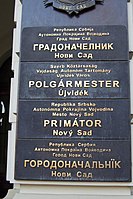
Photo from wikipedia
Abstract The present study investigated the effect of language-switching training on the neural correlates of both reactive and proactive control in bilingual language production, as well as the modulating role… Click to show full abstract
Abstract The present study investigated the effect of language-switching training on the neural correlates of both reactive and proactive control in bilingual language production, as well as the modulating role of the proficiency level of the second language (L2). During the pre-test, Chinese-English bilinguals performed a picture-naming task while being scanned with functional magnetic resonance imaging (fMRI). Participants then took part in an 8-day training on language switching and performed the same task again in the post-test. The results suggest that language switch training facilitates the neural correlates for reactive control, resulting in reduced activation in some brain areas. Such effect also transfers to proactive control, especially for lower-proficiency bilinguals. The present study not only provides evidence for the plasticity of the neural mechanism of bilingual language control, but also highlights the role of the L2 proficiency in bilingual word production.
Journal Title: Journal of Neurolinguistics
Year Published: 2020
Link to full text (if available)
Share on Social Media: Sign Up to like & get
recommendations!